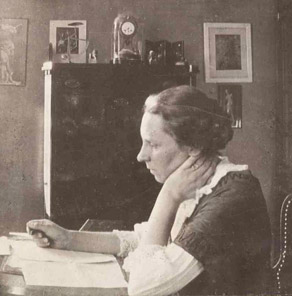
By Henriette Roland Holst-Van der Schalk
“Like the petty-bourgeois-nationalist social democrats and moderns, we revolutionary socialists arouse the masses to organization. It is indispensable, to defeat the tremendously strongly organized capital. But unlike all non-revolutionaries, we say to the masses: organization in itself is not yet a key to power, not a road to freedom. It leads nowhere else but to slavery and opens nothing else but destruction, when not used as a tool in the class struggle. The proletarian organizations included many millions of workers in 1914. But when the greatest political crisis of the modern centuries sailed across the countries like a whirlwind, the social-patriots throughout West Central Europe put these millions-organizations at the disposal of the imperialist classes. Not least through the proletarian organizations and the proletarian press, imperialism succeeded in placing all the economic and spiritual forces of the peoples in the service of war, that is, to militarize the peoples, gag them, starve them and make them slaughter each other. A thousand times better no proletarian organization than one abused for such purposes!
Therefore, organization in itself is not the source of well-being – we also challenge the Social-Democratic dogma that the unorganized masses are not capable of anything good. Even masses, which due to historical circumstances have lagged in organizational terms, can show great strength in the struggle for freedom when they are animated by revolutionary enthusiasm, forged together by one will and one spirit. Against the terrifying example of the German working class in 1914, which placed its entire admirable organizational apparatus in the service of German imperialism, and against the no less reprehensible act of the American workers’ aristocracy, which in 1917 in the same way offered Anglo-American capitalism its strong trade union center – we set the heroic masses of the Russian proletariat, which, unorganized as they were, overthrew Tsarism and dethroned the bourgeoisie in two revolutions.
Proletarian organization, unfortunately, does not mean struggle for socialism in all cases. But struggle for socialism does mean organizational activity in all cases. The new organization which the proletariat needs to crush imperialism can only be born in this struggle of the masses.
But how will the masses fight? What means of power do they possess that can stand up to the might of the imperialist state? What forces dwell in them to which the awesome power of their rulers will have to bow? Do they possess such power?
‘Yes,’ the revolutionaries answer, the masses possess such a force. In the great final struggle for freedom, three main means are available to them, namely: the demonstration, the strike and the armed insurrection, actual violence. Using these means, the proletarian social revolution will prevail.”
(from Chapter 1)
Content
- Foreword to the 2023 Dutch republication. 1
- 1. Purpose and means of the revolution. 3
- 2. The mass demonstration. 5
- 3. The armed violence as a revolutionary factor 10
- 4. Mental violence and actual violence. 13
- 5. The cult of violence in imperialism.. 17
- 6. Proletarian revolution and violence. 22
- 7. The mass strike; the great means of struggle and violence of the proletarian revolution. 26
- 8. The chances of the revolutionary strike during and after the world war. 29
- 9. The military strike (mass refusal of service). 35
- 10. Two methods (the evolution of revolution). 42
Source
Henriette Roland Holst – Van der Schalk, The means of the struggle of the social revolution. 1918.
Recent Comments